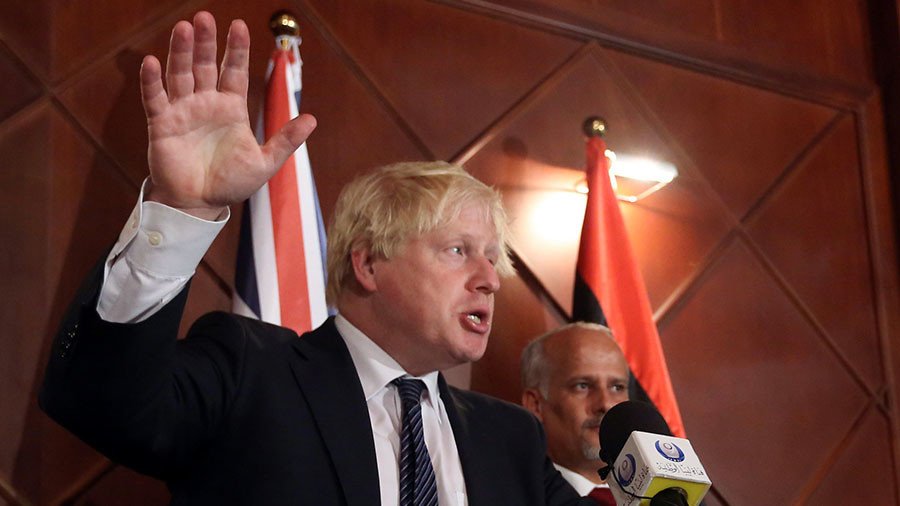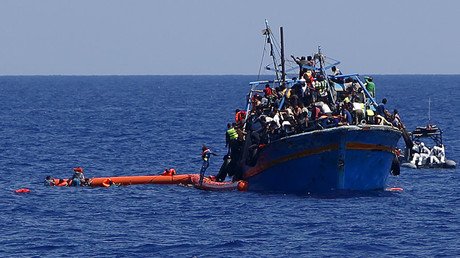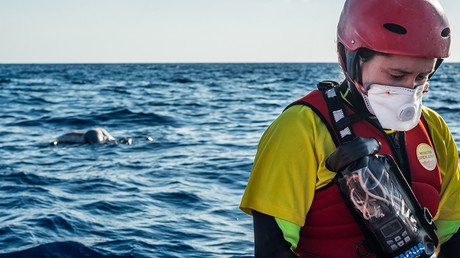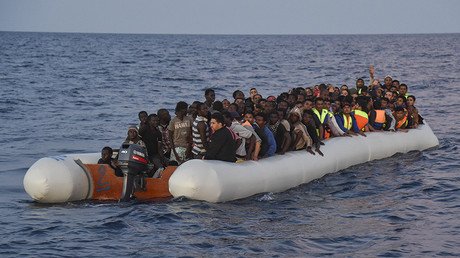Have Boris Johnson’s Libya friends gone rogue, or is UK complicit in breaking intl rules?

UK Foreign Minister Boris Johnson beamed at the cameras as he shook hands with officers from the Libyan Coastguard near Tripoli last summer. He was examining new British-taxpayer-funded boats.
Months later, the façade around the newfound friendship has fallen, and the trip to Tripoli looks more like a desperate attempt to disguise diplomatic disasters.
On the August 2017 trip, Johnson pledged to give Libya £9 million (US$11.5 million) to help stem the flow of migrants to Europe from the war-ravaged North African nation.
Six years after British intervention helped destabilize dictator Muammar Gaddafi’s country, and the consequences are severe. The deadliest migration route in recent history is across the Mediterranean Sea. Tens of thousands have launched deflating dinghies or crammed themselves into dangerous wooden boats in a bid to flee enslavement, rape and torture in Libya.
During Johnson’s grandstanding visit, NGOs warned the decision would come back to haunt him. The same Libyan Coastguard (LCG) is repeatedly breaching rules made in Europe and is using its multi-million pound package of new toys to harass vessels in the Mediterranean. Accusations of corruption and collaboration with people-smugglers have blighted the new allegiance backed by the EU and partly-funded by Britain.
Last week, RT UK was onboard an NGO search-and-rescue boat when the LCG – and Europe – brazenly broke with the Geneva Convention of 1949. Under the agreement, all signatory nations agreed to the non-refoulement of people in danger – meaning anyone found in a search-and-rescue mission should not be returned to an unsafe port – or place they have reason to flee.
On the surface, it would seem Johnson’s new friends have gone rogue, testing out the millions of pounds of equipment bestowed upon them in a gigantic £78 million training package in 2017. The heavy-handed crew, recently trained by the Italians, could have pleaded ignorance, but the order came directly from Europe.
On Wednesday, the Maritime Rescue Coordination Centre in Rome put out a call outside al-Khums, Libya. More than 100 people were floating 40 miles (64km) off the coast of Libya, in international waters.
Spanish NGO Proactiva Open Arms answered – ready to rescue the floating raft, with all lives on board in danger. However, the crew was held back while the LCG took control of the “rescue” – dragging every person on board back to Libya.
While the operation was hailed as a successful rescue in the Libyan media, the mission was a huge break from the final version of the Geneva Convention. Kofi Annan, former UN secretary-general and Nobel Peace Prize, is among those accusing Europeans in being complicit in breaking the convention.
More than 100 people fleeing the war-torn nation, were returned to Libya where human rights groups have documented murder, rape, slavery and indiscriminate abuse largely targeting black people.
This is not the first time the Libyan Coastguard has outraged human rights groups. In November 2017, German NGO Sea Watch filmed as the Libyan Coastguard carried out what it labeled a “rescue.” The boat of the would-be asylum seekers was hit by the Coastguard vessels, which made little attempt to protect lives.
The harrowing footage saw one man clinging to a ladder as a vessel sped up. Five people died in the botched mission. The guards also fired shots above the rescue boats.
Last month, rescue operations by French charity Doctors Without Borders (MSF) were disrupted by the coastguard, as crews were “forced to watch” men, women and children in search of refuge being turned back to North Africa. In one operation, 65 people are believed to have died.
Last weekend, 100 people perished off the coast of Libya as they attempted to escape, with just three men surviving.
However, as Europe struggles to find an answer to the refugee crisis, which has seen mass migration since 2015, the EU is relying on dictatorships and corrupt nations to solve their problems, often throwing funding at them without a care for the consequences.
Despite the massive amount of funding given to the Libyan Coastguard – controlled by the UN-backed Unity Government, which has lost ground to militia groups – refugees and migrants are still launching boats from shores east of the capital, Tripoli.
David Cameron’s military intervention in Libya had disastrous consequences for the North African nation, after repeated aerial bombardment campaigns in the NATO-led campaign.
Military operations began in 2011 after mass civilian casualties and human rights abuses during the civil war. A coalition of Belgium, Canada, Denmark, France, Italy, Norway, Qatar, Spain, the UK and US sought to overthrow the Gaddafi regime. Yet after the killing of the longtime Libyan leader, the country was all but abandoned.
The replacement government requested a NATO mandate for military action to continue, but the bloc’s Security Council voted to leave the nation.
The Unity Government now has control of Tripoli, but the majority of the country is ruled by competing militias, who sell migrants to one another and run smuggling rings throughout the country.
Brutal groups beyond the government’s control operate slave markets while raping and torturing those desperate enough to turn to them. Criminal gangs, some in former Islamic State (IS, formerly ISIS)-run areas, are accused of working with the coastguard in Libya.
By Zoie O'Brien, RT, from a migrant rescue boat in the Mediterranean
Think your friends would be interested? Share this story!

















